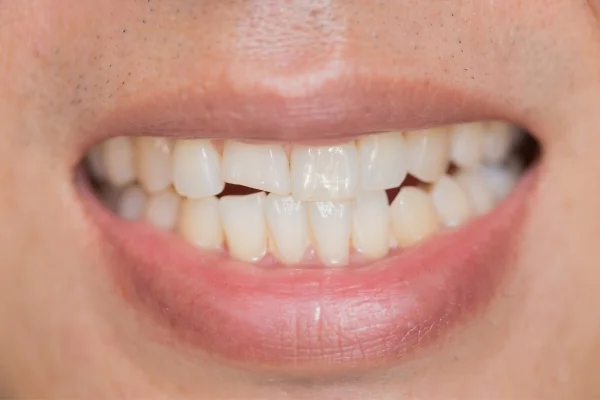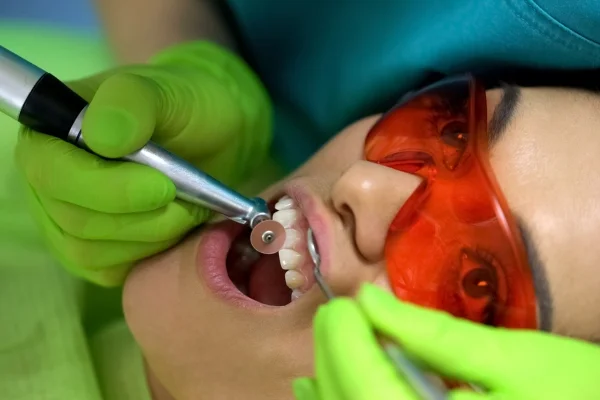Ever noticed a little piece of your tooth missing or cracking? That is the reason why our teeth begin to chip. It can be very irritating, especially when it reoccurs. But don’t worry though, chipped teeth are not unusual, there are causes for this and there are solutions to it. Many people are aware of why their teeth can chip, and fortunately, only a few of these instances are severe and can be easily avoided. Now it’s time to look at the reasons why your teeth could be chipping as well as some methods that may help to prevent this.
Common Causes of Chipped Teeth

While teeth are some of the hardest body structures, they are not indestructible. Sometimes the smallest of things can happen that can damage our teeth and make them chipped. One common cause is when a person chomps down on something hard like ice, hard candy, or even nuts. Sometimes if our teeth bite on something hard it’s possible that it will crack or break off a fragment. That little crack, which isn’t even really smart initially, begins to swell if we are careless.
Another reason is, that we sometimes grind our teeth, especially during sleeping at night. Most people clench or grind their teeth unconsciously. It can also lead to our teeth wearing out, which makes them brittle and prone to chipping. In cases where we think that we might be grinding our teeth, we need to look for ways of relaxing since stress or anxiety causes teeth grinding.
And don’t forget accidents! Occasionally, chip a tooth if one has a fall or experience an accident to the face. We can trip and injure ourselves while playing sports, and sometimes when we fall hard on our teeth, we chip them.
Foods That Can Cause Chips
There are hard foods like ice, hard candy, popcorn kernels, and even crusty bread which can sometimes cause chips. These foods can be really tough on our teeth, especially if we bite down too hard or at the wrong angle. One needs to be very careful when eating these foods so they can help avoid unexpected chips!
What is Teeth Grinding and What Are The Effects

Bruxism is the habit where we move teeth up and down or from side to side, especially during sleep. Hmm, maybe it doesn’t sound like a big deal, but I have to tell you that rubbing can destroy dental enamel. Enamel is a fine appreciable porcelain-like coating to the exterior of the teeth. Our teeth, when worn out, can easily be chipped or broken and this results in increased vulnerability of teeth to decay.
How to Know If You’re Grinding Your Teeth
Usually, you can identify teeth grinding with symptoms such as waking up with jaw stiffness, muscle tenderness surrounding your mouth, and even mini migraines. If this is a concern, a dentist must examine the state of the teeth and advise on how the grinding might be fixed.
Weak Enamel and Chipping
At other times, the teeth are chipped because the enamel that protects our teeth is not thick enough. While enamel isn’t as thin or weak, it can become compromised with time. We know that habits such as consuming lots of soda, fruit juice, or even some sports drinks weaken our enamel.
Other behaviors such as brushing our teeth hard can also contribute to our enamel thinning. So if we are to brush harder our teeth are going to be clean right? Wrong, it causes the enamel to wear out and our teeth become sensitive and easy to chip. To reduce enamel from wearing out, it is recommended to use a gentle toothbrush and brush carefully.
How to Strengthen Enamel
Some of the best measures for maintaining or rebuilding the enamel are through the use of fluoride toothpaste. Fluoride assists in the deposits of more enamel on the surface besides making the enamel hard.
Bad Habits That Lead to Chipped Teeth
People do not consider the fact that many of the things they do are actually damaging their teeth in some way. Some actions we can perform unconsciously might cause chipping, the following are some of the things we take lightly. One of the habits that most people display regularly is the use of teeth to do things that should be handled by other appropriate tools. You know when we attempt to open the bag of chips with our teeth or when we just attempt to bite on something that just isn’t edible? Therefore, one should not use teeth for cutting cables or breaking plastic packaging. This way, a lot of pressure is placed on the teeth and as such they end up cracking or chipping. A habit that is injurious to our teeth is also the habit of biting on items. This ranges from nail biting, chewing on pen or pencil or even crunching on ice. All these things are more difficult than our teeth were designed to meet or grapple with. Chewing something hard, repeatedly will cause our teeth to demineralize and thus become susceptible to fracturing. What is more when it appears safe to chew on these items; it has the potential to ruin our teeth over time.
Effects of Biting Nails on the Teeth and Their Health
Those who bite nails aren’t only damaging their hands, but also harming their teeth. That is why when we are chewing on our nails, a lot of pressure is put on the front teeth leading to minute chipping or fracturing. If done continuously it progressively harms the teeth and makes the teeth more vulnerable to chipping off.
How Age Affects Tooth Strength
This is the natural process as we age, our teeth start to decay causing so many problems. The outer protective layer, enamel, becomes somewhat softer and more brittle over time, a condition that leaves the teeth open to chipping and even cracking. This is a natural process in human life, but some steps should be taken to get your teeth saved as you age. Therefore, regular brushing, flossing daily, and seeing the dentist for a check-up are all that are required to adopt good dental hygiene.
People see that their teeth have become more sensitive or that they break when eating hard foods. This is more so if the enamel covering the teeth has thinned out due to one reason or the other. The one consolation, however, is that there exist some treatments that can be taken to prevent further chipping of the teeth. Regular use of fluoride toothpaste and not taking hard or sticky food also go a long way in ensuring our teeth remain strong all through the time.
Dental Health Maintenance through Old Age
Maintaining aged teeth includes avoiding or minimizing the use of acidic products, and instead using products, that build the enamel such as fluoride-containing mouthwash and toothpaste. The dental exams can also notice any signs of wear and tear in the contacts so that we can attend to them before they become huge issues.
Dental Treatments for Chipped Teeth

But what if one day your tooth chips? The good news is that there is actually a list of things that can be done to fix it. The appropriate treatment shall vary in proportion to the size of the chip and location. Sometimes when chipping is small, your dentist will recommend the process known as dental bonding. This is where they get a special material known as a composite which is of a tooth color to fill in a chipped-off area to take the look of the tooth. Bonding is one of the simplest techniques and is suitable for small chips.
In cases where the chip or the crack is relatively big, then the best solution is going for a dental crown. A crown is something like a cap that would cover the entire tooth and prevent it from further breakage and would look like an original tooth as such. Crowns are better than bonding and are therefore used where there is a large chip or if a tooth is still fragile.
Sometimes, it can be more serious, in which the actual chip is severe enough to damage the inside of the tooth requiring a root canal treatment. It is only done where the nerve within the tooth is affected or operated upon in some way. He or she will then cover the treated tooth with a crown because, after the root canal, the tooth is weak.
Bonding vs. Crowns
Bonding is best for small chips that don’t affect the strength of the tooth. It’s quick and doesn’t require much work. Crowns, on the other hand, are better for larger chips or cracks because they cover the entire tooth and provide extra strength.
When to See a Dentist
If you discover that you have a chipped tooth you need to visit a dentist immediately. The chip may look tiny and you may not feel any pain but you should seek medical attention. It can also be glib that while at first glance the issue appeared to be a minor loss, as time went on the problem became more profound. The longer it takes to go see a dentist, the more the tooth may get worse and damaged or the chip may enlarge. Even more so if the chipped tooth is sensitive, especially when consuming hot or cold foods and beverages, they should seek treatment immediately. Pain is always an indication that the problem is beyond the enamel or outside covering of the tooth. Everyone will be pleased later in the day when the dentist diagnoses the situation, repairs the chip, and addresses the possibility of future harm.
What Happens And Why Early Treatment Matters
A chipped tooth, when fixed as soon as possible, will reduce the severity of the problems in the future. When small chips go untreated they can lead to larger cracks and that can need treatments such as a root canal or a crown.
Final Thoughts
Broken teeth can be quite frustrating but they are quite a regular occurrence and are pretty simple to solve. Then knowing why they chip in the first place is the best way of preventing it from recurring in the future. In simple things like accidentally biting down on something hard, clenching our teeth when we sleep, or just general wear and tear, knowing the root of the problem helps us avoid the same.
Basic steps always encouraged as measures to retain a good and healthy mouth include brushing the teeth, avoiding things such as pens and standing up and gripping objects with our teeth, or participating in activities such as sports. But if we do chip a tooth, getting to the dentist as soon as possible will prevent the situation from worsening, and will help keep our smile in tip-top shape.
FAQs
1. What causes teeth to chip?
Teeth can chip from biting down on something hard, like ice or candy, from grinding your teeth at night, or from accidents like falls or sports injuries.
2. How can I prevent my teeth from chipping?
To prevent chipped teeth, avoid chewing on hard foods, wear a mouthguard during sports, and take care of your teeth by brushing and flossing regularly.
3. What should I do if my tooth chips?
If your tooth chips, it’s important to see a dentist as soon as possible. Even small chips can lead to bigger problems if they’re not treated.
4. Can chipped teeth be fixed?
Yes! Dentists can fix chipped teeth with treatments like bonding, crowns, or even veneers, depending on how big the chip is.
